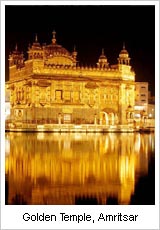Introduction:
Punjab suffered the most destruction and damage at the time
of partition of India. Prior to partition the Punjab extended
across both sides of what is now the India-Pakistan border,
and its capital Lahore is now the capital of the Pakistani state
of Punjab. The major city in the Punjab is Amritsar, the holy
city of the Sikhs. Chandigarh, a new planned city, was concieved
and built in the 1950s to serve as the capital of the new Punjab.
In 1966, Punjab underwent another split. It was divided into
the predominantly Sikh and Punjabi- speaking state of Punjab
and the state of Haryana. At the same time some of the northern
parts of the Punjab were hived off to Himachal Pradesh. Chandigarh
on the border of Punjab and Haryana, remains the capital of
the two states, yet is administered as a union territory from
Delhi. The Punjab's per capita income is nearly double the all-India
average (in second place is Haryana). Although Punjabi's comprise
less than 2.5% of India's population, they provide 22% of India's
Wheat and 10% of its rice. The Punjab provides a third of all
the milk production in India. Punjab also has a number of thriving
industries including Hero Bicycles at Ludhiana. From the travellers
point of view, the area has just one attraction -the beautiful
Golden Temple in Amritsar. Apart from this the states are mainly
places of transit for travellers on their way to the Himachal
hill stations, Pakistan, and Kashmir.
Sightseeing:
Amritsar:
Visit the Golden temple - The sacred Sikh sanctuary, marbled,
bronzed & covered with gold leaf wherein the Guru Granth
Sahib- The 'Sacred Book' of the Sikhs is placed reverently.
Also see the Community Kitchen where 10000 pilgrims are fed
daily on voluntary and complementary basis. Visit the historic
Jallianwala Bagh where Gen. Dyer's bullets killed scores of
innocent Indians and the beautiful Ram Bagh Gardens.
Chandigarh:
Chandigarh was designed by Le Corbusier, is the state capital
of Punjab and Harayana states. The famous French architect.
Half day tour includes visit to the Secretariat, High Court,
State Library, Assembly Chambers, University, Botanical Garden
and the beautiful lake. Asia's largest rose garden, Zakir Gulab
Bagh, spread out over 30 acres of land, boasting of 50,000 rose-trees
of 1600 different species!!
Covering an area of 56 square kilometres, Chandigarh is the
first `planned' city of India. The city has neatly laid out
roads and parks, buildings ranging against mountain peaks, boulevards
and streets lined by endless rows of trees and shrubs. The city
is named after the Goddess Chandi Devi, whose white - domed
temple stands on the slope of a hill in the north east of Chandigarh,
on the edge of the Shivalik hills. Spread over an area of 114
sq. kms, it is a modern city, built in 47 sectors.
|
|
 |

